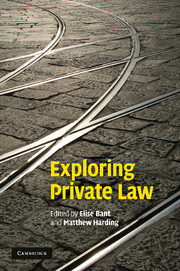Book contents
- Frontmatter
- Contents
- List of Contributors
- Foreword
- Acknowledgments
- Table of Cases
- Table of Legislation
- Introduction
- I Method
- II Unjust enrichment
- III Equity and trusts
- 11 What is left of equity's relief against forfeiture?
- 12 Contracts, fiduciaries and the primacy of the deal
- 13 Four fiduciary puzzles
- 14 Good faith: what does it mean for fiduciaries, and what does it tell us about them?
- 15 Trustees' duties to provide information
- IV Remedies
- Index
- References
15 - Trustees' duties to provide information
Published online by Cambridge University Press: 10 November 2010
- Frontmatter
- Contents
- List of Contributors
- Foreword
- Acknowledgments
- Table of Cases
- Table of Legislation
- Introduction
- I Method
- II Unjust enrichment
- III Equity and trusts
- 11 What is left of equity's relief against forfeiture?
- 12 Contracts, fiduciaries and the primacy of the deal
- 13 Four fiduciary puzzles
- 14 Good faith: what does it mean for fiduciaries, and what does it tell us about them?
- 15 Trustees' duties to provide information
- IV Remedies
- Index
- References
Summary
Introduction
Writing in 2003 in response to Armitage v Nurse, Michael Bryan provided an illuminating analysis on the modification of trustees' duties by exculpation clauses. In that context, he argued that ‘the “irreducible core” of trust obligation may be larger than envisaged by Millett LJ in Armitage v Nurse’. Millett LJ (as he then was) considered the trustee's irreducible obligations to include performing ‘the trusts honestly and in good faith for the benefit of the beneficiaries’, and rendering accounts to the beneficiaries. For the duty to account to have any substance, the beneficiaries must have correlative rights to inspect trust accounts. As Millett LJ put it, ‘[i]f the beneficiaries have no rights enforceable against the trustees there are no trusts’; ‘[e]very beneficiary is entitled to see the trust accounts, whether his interest is in possession or not’.
These latter observations in Armitage v Nurse have now been extensively relied upon to justify beneficiaries' rights to obtain information about the trust, an area of law that has long been fraught with difficulty. The proprietary justification for beneficiaries' rights to information and the circular test of ‘trust document’ laid down in Re Londonderry's Settlement are antiquated and do not provide a transparent analytical tool for adjudicating disputes.
- Type
- Chapter
- Information
- Exploring Private Law , pp. 343 - 360Publisher: Cambridge University PressPrint publication year: 2010
References
- 1
- Cited by



